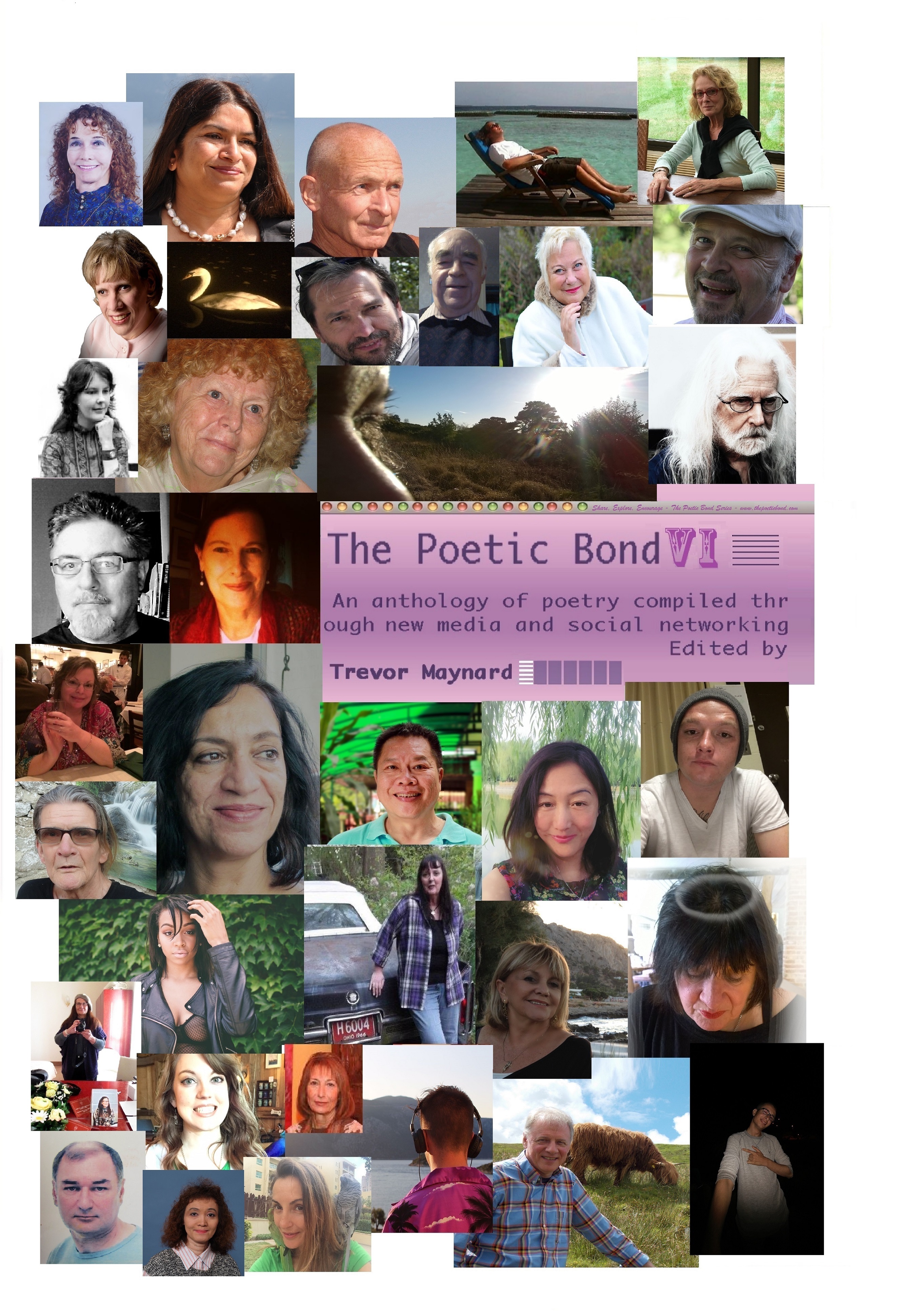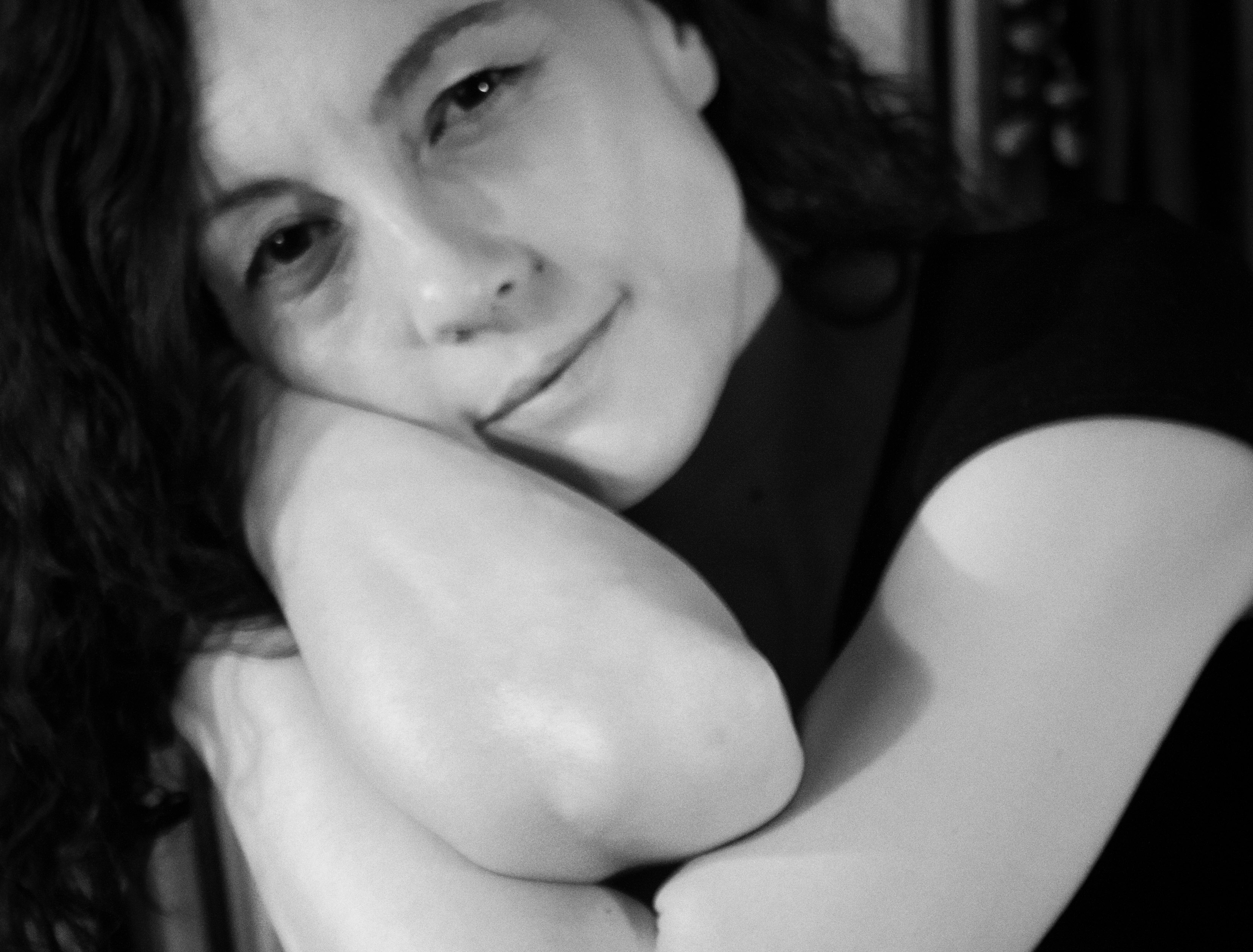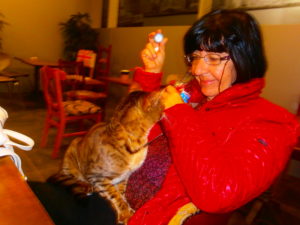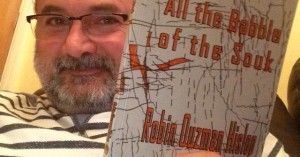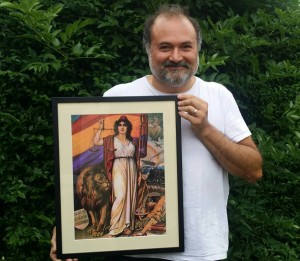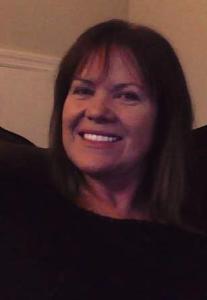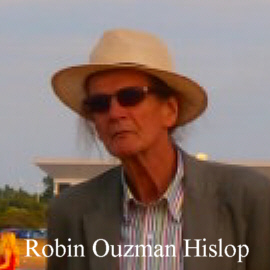THE POETIC BOND VI ISBN-13: 978-1539334682
The Only ANNUAL INTERNATIONAL POETRY ANTHOLOGY
actively sought specifically from New Media, Social and Professional Networking
Available at The Poetic Bond
&
Amazon.com The Poetic Bond VI
William DiBenedetto – time comes uninvited / 7-May-15
William DiBenedetto is a freelance writer and editor living in and loving Seattle since 1994. Born many years ago in New York City, he grew up in Northern Virginia and worked as a journalist in Washington D.C. He graduated from the University of Virginia with a degree in English.
Will Walsh – Onion Creek, Utah / As I live and breathe / Evolution of Human Movement I describe nature in a mystical context, illuminating the life and moods of wild places. I also write to encourage people toward their potential, and to thrive without greed, mayhem, hate, or anger. Our actions promoting tolerance, mutual respect, and cooperation will contribute to a more just and peaceful world. http://quietjourneys.blogspot.com/
Wendy Joseph – This is America / In my house there are books / when the water rises
Wendy Joseph sailed on cargo ships worldwide for ten years. She holds two Master’s in English, and this is her second appearance in the Poetic Bond. She is also a playwright, actor, and novelist. She lives in the wilds of Washington State with very remarkable people and two cats. www.wendyjosephwrites.com www.facebook.com/TheWitchsHand
Swaizi Vaughan – E-Turn Next Left Dead In / Prepubescent Khonsu
Swaizi Vaughan was born in Gainesville, Texas and has always remained true to her emotions in their rawest form.
She is inspired by all things but often illustrates love. Her poignant thoughts and feeling adorn the pages of her
first book to be released in 2017 entitled, Love’s Lobotomy.
Rowland Hughes – Lemon Soap / A Valley Funeral
Rowland is a Welsh writer and poet. To care for his brother, he was taken out of school at 14 years old.
Ill health forced him to retire from work as a Local Authority Assistant Surveyor in 1997.
He writes in bustling cafés or in the tranquil confines his shed. www.rowlandhughes.com
Robin Ouzman Hislop – Tenochtitlan / In Bed
On line Editor at Poetry Life and Times, Artvilla.com & Motherbird.com. His latest publications are a collection of poems All the Babble of the Souk & Key of Mist a translation from Spanish of the poetess Guadalupe Grande both are published by Aquillrelle.com for further information with reviews and comments see Author Robin .
Pushpita Awashti – In my heart of hearts / Words in the Dark
Poetess, fiction writer, translator and literature ambassador, Professor Pushpita Awasthi has dedicated her life for the expansion and proliferation of humanity oriented literature. She taught 20 years university at India. Five years she worked at Indian Embassy now settling in the Netherlands as director of Hindi Universe Foundation. www.pushpitaawasthi.com, https://nrcwebwinkel.nl/boeken/het-beeld-in-de-rots-the-statue-in-the-rock
Neetu Malik – dancers / the pianist / wanderer
Neetu weaves life experiences and observations into her poetry and short stories. Fascinated by human nature and its complexity, she strives to convey its intricacies, struggles, and emotions through vivid and visual poetry, often drawing pictures with words to create images that seize and crystallize the transient moments of life. facebook.com/neetuwrites
Nana Tokatli – Wheat Fields
Nana Tokatli , painter and poet, is Greek. Graduate of the Fine Arts School of Athens. Has 17 solo shows. Since 2000 writes poetry in greek and in english, short stories in greek. Publications in english: 2003 “to the counter-point” received 5 stars at AbeBooks, UK. 2015 “the Rondo symphony”.
Michael Bunny – Cards
My name is Michael, I’m an 18 year old poet / writer / lyricist from Israel. I started writing when I was around the age of 7, and have always been passionate about expressing myself through words.
Miklos Mezosi – An Iamblified Inquiry
A published author and scholar, Miklos Mezosi writes on literature and opera. Miklos, who was a Mellon fellow at Edinburgh University,authorized a book on Russian opera. He has published two poetry collections. He writes in Hungarian, English, Latin and Greek.His English poetry is published in anthologies in the UK. http://www.linkedin.com/in/miklosmezosi http://ibs-b.academia.edu/MiklosMezosi
Marli Merker Moreira – Drifters
Forever, I am a teacher of literature. Writing emerges from loving words and music. As a Brazilian with German roots and a long university experience in the US, I value the multicultural mosaic of people, beliefs, and cultures. I dream of peace and freedom for us all.
Madalena Fine – Lost Letter From Love
Madalena Fine is an anglo-portuguese creative writing student from Sussex. Her writing explores relationships and identity. She was spurred to writing again in 2015, after a public reading of Warsan Shire’s “What they did yesterday afternoon”. Madalena’s bedside reading includes Warsan, Grace Nichols, John Agard, Caroline Bird, Wendy Cope and others…
Linda Mills – Abide / Winter Sleep
Nearly blind from birth, language fills my life. I flex my words to communicate this world as I experience it.
For years I’ve had poetry published in magazines around the world and more recently online. Now retired, I am able to write and to travel with my very supportive husband.
Lawrence W. Lee – Cynic / Still Life
I have made a good living as a professional artist for almost fifty years. I’ve seen fire and I’ve seen rain.
I have known love and loss in near equal measure. I am interested in almost everything, but have special fondness for language and subatomic physics. I continue to paint. http://lawrenceleeart.com
Kwai Chee Low – Cold Winter, Warm Heart
Kwai Chee Low from Malaysia has a love for the English Language from a young age. He started writing poems since 2010 and submitted them to Poemhunter.com and Allpoetry.com. He finds it very gratifying and fulfilling expressing his thoughts and feelings into poems and haiku. He is also a member on LinkedIn.
Judith Neale – One Cleft Moon
Jude Neale is a poet, spoken word performer, opera singer and mentor. Her last book, A Quiet Coming of Light, was a finalist for the Pat Lowther Award, best poetry collection by a Canadian female.
Joseph J. Simmons – 1914
Joseph Simmons entered college a physics major, graduated an English major, began sharing evening s with other poets. He spent years in federal contracts, now writes, publishes, tries to sharpen and refine his voice and vision.
Jill Angel Langlois – If the Wind Blows / I remember silence
Jill Angel Langlois grew up in Park Forest, IL. Her poems and short stories appear in literary magazines, nationally. Collections: Scattered Petals explores the healing power of nature. Whiskey Nights inspired by whiskey and music. “Tell Me The Story,” a memoir, portrays growing up adopted, reuniting with her birth mother.
Ian Colville – A Cliché for our Time / Ploughing
Ian Colville was born in Scotland, but is presently exiled in England where he is open-mic regular at Ouse Muse in Bedford. Ian has over 50 poems published in curated magazines and anthologies, including The Poetic Bond. When he’s not writing, he’s reading, and sometimes he goes cycling… for hours. http://iainthepoet.blogspot.co.uk/
Hongvan Nguyen – Becoming
Hongvan Nguyen is an English and philosophy graduate from George Mason University. She is the author of two collections of poetry, Under the Stone, and The Chickadees. Her third book, Crossing Places, is in the publication process and will be out on the market by the end of 2016.
Greg Mooney – Insecurities
I am an active duty United States Marine, I am 3 classes away from my bachelors in Marketing, currently writing a book that will be dedicated to a deceased friend.
GK Grieve – The Final Moment Before The Death of Swans / Addict
Travelled here and there, picked up a few observations, my book “The Final Moment Before The Death of Swans” is to be published in November. Website under construction. Still married. All in all, tickety-boo.
George C Robertson – Engraved / A Burning Desire
Worked for many years in telecommunications in the UK and abroad. His Kindle novel Terror at the Towers relives his Human Shield time in 1990s Kuwait. George has been praised for his humorous verses and short stories, published in English and Scots. Song lyrics commended; looking for a music partner/promoter. geo.dor@tiscali.co.uk
George Carter – When I got there
George showed an interest in poetry and music from an early age, and is currently working towards university
intent on pursuing a career in music and sound.
Diane Collette – Fields of Asphodel
Hails from Bucharest, grew up in Jupiter & traveled the globe in US uniform and is now Corporate Analyst in NYC area.
My love of writing came to fruition over many years while in military life, seemed like pleasant way to deal with tough times, emotions and life in all its wonder.
Diane Burrows – Speechless / Take a Look at the Hills
At 9 years old, my teacher predicted: you’ll be a poet. Since then, encouraged by adverts for poetry, I have written in many published anthologies and I was awarded prizes at a poetry- readings. Thanks to the encouragement of Poetic Bond, here I am back again, enjoying sharing my contributions.
Cigeng Zhang – Hey, Starling / Special Reunion / Wa Lan (瓦蓝)/ One-line Tide
Cigeng Zhang is a freelance English translator from China. She started writing English poems in 2012. Her poems ‘Drunk Smile’, ‘What Was Left’, ‘The Moon, The Poet’, ‘At 8 O’clock’ and ‘Still for You’ were included in the Poetic Bond III, IV and V respectively since 2013.
Christine Anderes – The Ossurary of James / The Unquiet Heart
Christine Anderes …a conservationist and passionate animal advocate is currently working on three collections of poetry and a series of critical essays attesting to the beauty and resilience of nature using lyricism and humor to bring more mindfulness to the critical state of the planet and its inhabitants.
Carey Link – Blur Distinctions
Carey Link is from Huntsville, Alabama. She has been writing poetry for over twenty years. Link’s two collections of poetry are What it Means to Climb a Tree (Finishing Line Press) and Awakening to Holes in The Arc of Sun (Mule on a Ferris Wheel).
Bonnie Roberts –Cautionary Steps of Love
Publisher at Mule on a Ferris Wheel; poet; activist; ocean-swimmer; silent retreatant; dog “herder”; graduate poetry-writing professor; Fulbright Scholar; NEH Fellow; winner, an Alabama Book of the Year Award.
Bonnie J. Flach – At the Crossroads
Bonnie J. Flach – Poet, writer & photographer, for the non-profit “Ocean Artists Society” & member of the Shelter Island Art Assoc. in San Diego. Bonnie writes primarily, but not limited to, poems & stories on nature, wildlife and indigenous people themes. She also submits her poem for The Australian Times Poetry electronic magazine
Betty Bleen – Grandma’s Jesus / The Cutting Edge
Betty Bleen’s poetry appears bi-weekly in the Ohio Chinese American News, Columbus, Ohio. She has read at various venues in and around Columbus. Her book of poetry, Bad Red Shoes, is available on Amazon and she has contributed to three anthologies. Betty lives with husband Doug and Mittens the cat. www.toocutetoboop.com https://www.facebook.com/poet.BettyBleen/
Belinda Dupret – Isobel
Belinda Dupret won her first poetry competition aged 9 – never won another! She’s been a music promoter; freelance writer; Television Journalist and PR Chief, working in 6 different countries including New Zealand, Australia, and the USA. Her life experience means she brings a world of humanity and imagination to her writing.
Beki Behar – Procession
Rebecca Behar is a French writer, poet and slam performer. She has published fiction and children stories, CDs of poetry and music, philosophy and literary criticism. Recent book published : “Poèmes urbains” (Edilivre)
Amanda Eakin – The Broken Repairman
Amanda Eakin is an Ashland University graduate who enjoys reading, writing, and surreptitiously looking for grammar errors in social media. She taught English for a few years and is currently enjoying her time in a Communication Center for a Fortune 500 company
Trevor Maynard – Take Flight / crushed
Published three books of poetry, the last GREY SUN, DARK MOON, in 2015; appeared in several magazines, as well as performing open mic sessions. Also edited several books of poetry, written and directed plays in London and Edinburgh. Married to Jo, has four children, eight grandchildren, and two cats. www.trevormaynard.com
-
At 8 o’clock
At 8 O’clock in the morning
She saw the sun as a hawthorn
She saw the cloud as an oleander
She saw the chimney as a river
Who did appear over there?
Surprised, on crutches was an old man
Sitting in a boat along a canal
Singing aloud an odd song —
In front of me there is a devil
Going to catch the Monkey King
Going to seize the trip taker
The devil is weird and tempting
She is a White Bone Demon
At 8 O’clock, this morning …
Cigeng Zhang
37 poets from 12 Countries Canada, China, England, France, Greece, Hungary, Israel, Malaysia, Netherlands, Scotland, Spain, USA, and Wales THE POETIC BOND VI
www.facebook.com/PoetryLifeTimes
www.facebook.com/Artvilla.com
robin@artvilla.com
editor@artvilla.com
Key of Mist. Guadalupe Grande.Translated.Amparo Arróspide.Robin Ouzman Hislop
goodreads.com/author/show/Robin Ouzman Hislop
http://www.aquillrelle.com/authorrobin.htm
http://www.amazon.com. All the Babble of the Souk. Robin Ouzman Hislop
www.lulu.com. All the Babble of the Souk. Robin Ouzman Hislop
https://www.amazon.com/author/robinouzmanhislop
http://www.innerchildpress.com/robin-ouzman-hislop.All the Babble of the Souk
